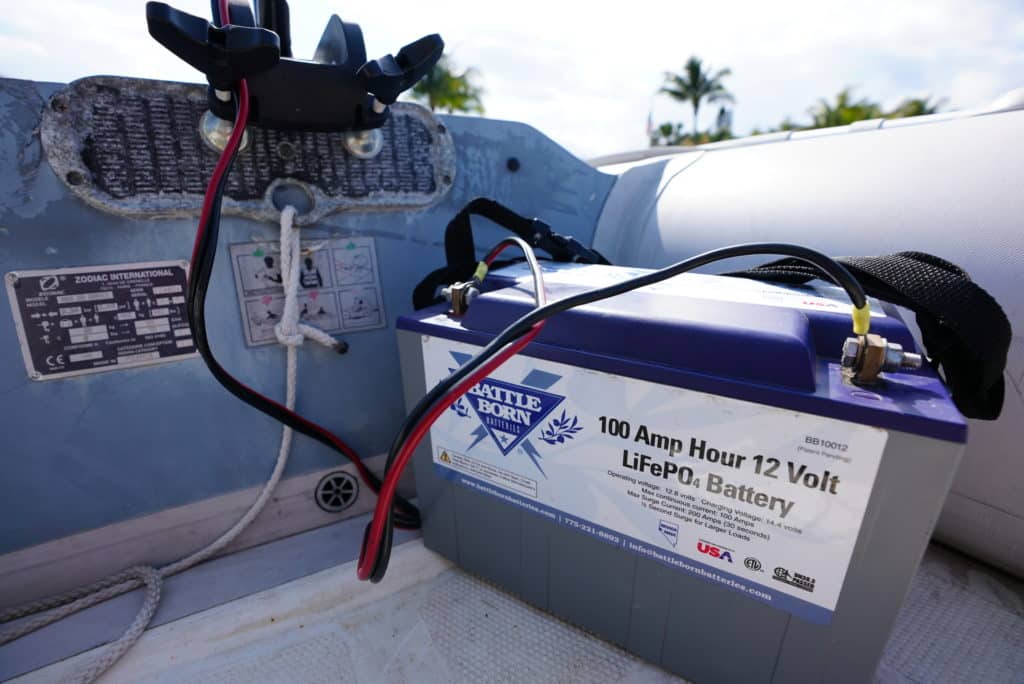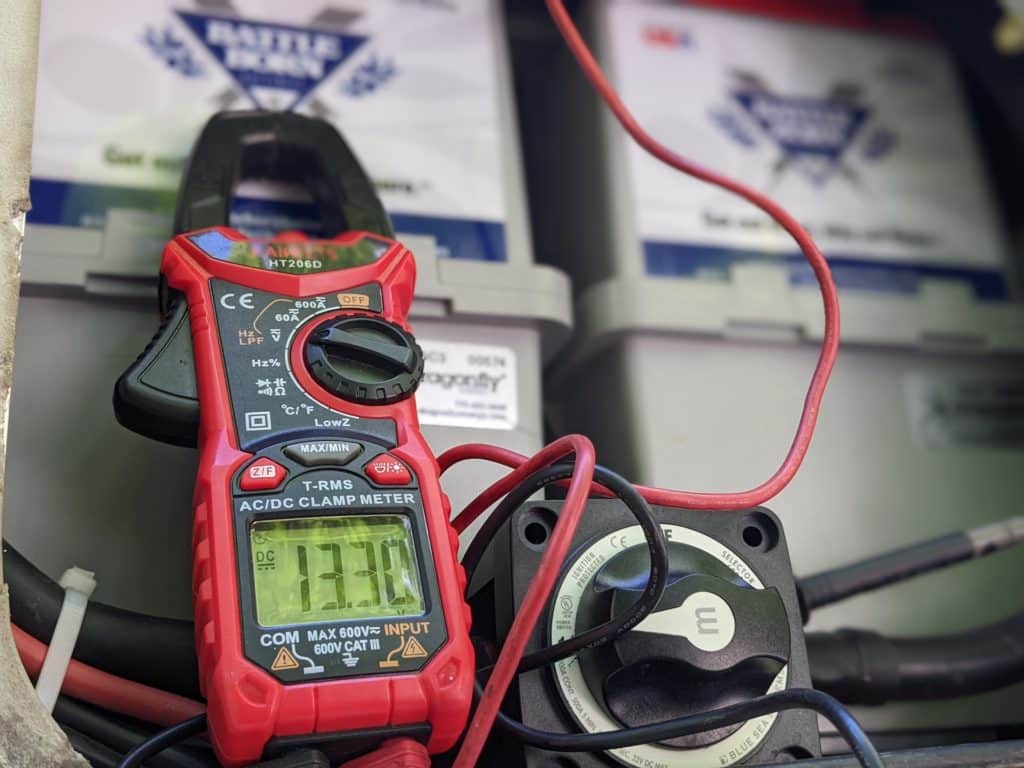
MENUMENU
TALK TO AN EXPERT
Special Hours: 7AM – 6PM PST
TALK TO AN EXPERT
Special Hours: 7AM – 6PM PST
From powering our phones to power tools, cordless household appliances, cars, and more, batteries are an integral part of our day-to-day lives. While batteries are in nearly everything, not all batteries work the same or offer the same amount of power. Understanding voltage is essential to knowing whether you need a 1.5-volt AA battery, a 12-volt car battery, or a 24-volt deep cycle battery for your application. There are a lot of common misconceptions about battery voltage, so we’re diving into what it is, how to measure it, and the chemical reactions behind it.

A volt is a potential difference across a conductor when a current of one ampere (Amp) dissipates one watt of power. Voltage is then defined as the pressure that pushes electrons (current) between two points to enable them to power something.
Battery voltage refers to the difference in charge due to the difference in the number of electrons between the negative and positive terminals of the battery. This is also known as “electrical potential.” The greater the difference in potential charge, the higher the voltage.
For example, on the negative end of a battery terminal, there’s an excess of electrons, whereas the positively charged terminal has a lack of electrons. The more electrons that the negative terminal has compared to the positive terminal, the higher its voltage.
Batteries are made up of an anode, a cathode, an electrolyte, and a separator. The anode refers to the negative side of the battery and is usually made of zinc, lithium, graphite, or platinum. The cathode, on the other hand, is the positive end of the battery and is usually made of some kind of oxidizing metal, such as lithium oxide, copper oxide, or graphite oxide.
Since the anode and cathode are separated, electrons can’t freely flow from one side to the other. This is where the circuit comes in. When the battery terminals are connected by a conductor, the electrons can move from the anode to the cathode, which creates voltage.

Although voltage and current appear to be interchangeable, they are different measures of electricity. Volts refer to the potential energy within a battery, whereas current refers to the rate at which the electrons are flowing.
Voltage is measured by volts (V), which represent the difference in electrical potential. Current is measured by the speed of the electrons, which are represented by amperes (amps). The higher the electrical potential, the higher the voltage will be, and the higher the amps, the faster the electrons will flow.

Measuring battery voltage is essential as it allows you to determine the battery’s state of charge. The best way to do this is with either a multimeter or a battery monitor. Both of these devices use sensors to measure the electrical potential difference between the two terminals on the battery. The corresponding voltage number is displayed on a screen, allowing you to calculate an accurate measure of the state of charge.

The definition of “normal” voltage will depend on the type of battery. A car battery will have a different voltage than a household AAA battery. The reason for these differences has to do with the type of chemical reaction within the cell that is creating the voltage. Reactions with more favorability of the oxidation-reduction reaction will produce a higher voltage.
In addition to the chemical reaction, higher-voltage batteries like a 12V battery have multiple cells in series to increase the voltage. A single AAA battery is only one cell, whereas an RV battery has 4 to 6 cells.
This is why the average, fully charged car battery will measure around 12.6 volts (also known as the resting voltage). Meanwhile, a AAA battery will only measure about 1.5 volts. These two different types of battery power electronics have completely different power needs. It’s extremely important to match voltage correctly so as not to damage the electronics or the battery itself.
The funny thing about battery voltage is that it changes depending on the charge of the battery. At full charge, a battery delivers a higher voltage than when it’s running low or empty. This phenomenon, known as voltage loss, will vary depending on the type of battery.
Traditional lead-acid batteries tend to experience much larger voltage drops than lithium batteries. This is because of the advanced battery technology that lithium batteries provide. They’re much more energy-dense and aren’t as strongly affected by Peukert’s Law.
For instance, a 12-volt lead-acid battery will deliver about 12.7 volts when fully charged but only about 11.6 volts at 20% capacity. Meanwhile, a lithium battery will deliver 13.6 volts when fully charged and 12.9 volts at 20% capacity.

By OSHA standards, battery voltage isn’t dangerous until it exceeds 50 volts. In most cases, the human body can safely endure up to 50 volts of shock, even with unlimited current capacity.
Regulators have based this theory on the power distribution of the human body, which shows the arms and legs to be at least 500 ohms (a unit of electrical resistance). This means that at 50 volts, a lethal current wouldn’t pass into the heart, even in the most dangerous circumstances.
However, if the voltage exceeds 50 volts, the human body can act as a conductor, which can be deadly. The dangers of high-voltage electricity (anything over 50 volts) include burns, broken bones, hearing loss, eye injuries, cardiac arrest, and even death. This is because 10 milliamps of electricity through the human heart can disrupt its electrical conductivity. Then, this can produce a fatal arrhythmia, so we consider all voltages over 50 volts dangerous.
Battery voltage matters for a variety of reasons. Namely, it allows you to determine how much power your battery is capable of supplying. This lets you know how much voltage you need for certain electronics and even the charge state. Without the ability to measure battery voltage, we would have no way of safely using batteries.

We know that building or upgrading an electrical system can be overwhelming, so we’re here to help. Our Reno, Nevada-based sales and customer service team is standing by at (855) 292-2831 to take your questions!
Also, join us on Facebook, Instagram, and YouTube to learn more about how lithium battery systems can power your lifestyle, see how others have built their systems, and gain the confidence to get out there and stay out there.
Shop Best Sellers








Ask a technical specialist now at 855.292.2831
Stay in the Know
4 thoughts on “What is Battery Voltage? ”
Well written explanation of batteries. I just installed a long range WiFi antennae to hopefully allow me to pick up network from structure that is approx 400 feet away. The antennae is connected to a signal booster box that is powered by 12v adaptor. I am looking to supple power needs with a battery and solar panels. I need 24/7/365 reliability. Can you offer advise on type of battery I would need. It is likely that I will also need to have battery supply power to a small heating mat as it gets pretty cold in the winter (sometimes below 0 degrees F.
Hi Michael! We offer heated battery options with low draw technology to keep your battery warm and ready to charge no matter what weather you may face. Check out the options through the following link: https://battlebornbatteries.com/?s=heated+batteries&post_type=product
To the battlebornbatteries.com admin, Keep up the good work!
Thanks for the clarification on battery voltage! I was thinking it was just about the amount of power a battery holds, but I didn’t realize it could also impact its overall performance and lifespan. Your breakdown of the different voltage levels was really helpful – I’ll make sure to keep an eye on my battery’s voltage from now on!